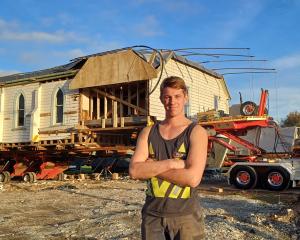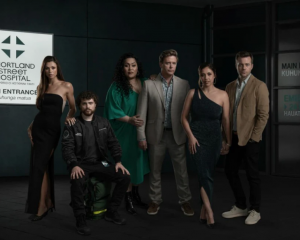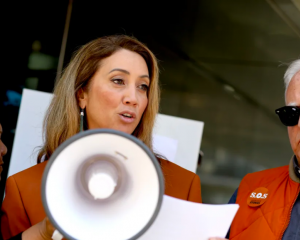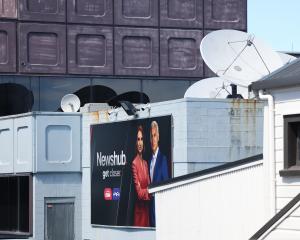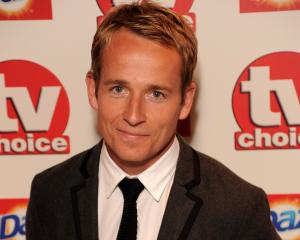
Just one episode into the third season of The Boys, the diabolically blackhearted superhero satire based on the comic book of the same name by Garth Ennis and Darick Robertson, and it’s completely clear —the show is the undisputed Exploding People champion of television. Back for another round of corporate malevolence, unhinged villainy, and fighting fire with fire, The Boys has lost none of its apparent willingness to pull the sort of moves that can only really be described as Going There, as in you the audience member saying “I can’t believe they went there!”
For those unfamiliar with the basic premise of the show, it’s set in a world that very much resembles our own, right down to the name-dropping of our actual celebrities and a healthy appreciation for the unthreatening rock of Billy Joel. But there’s a twist; actual superheroes exist, and are kept in a stranglehold as a hugely profitable company asset by mega-corporation Vought, in much the same way as, uh, mega-corporations maintain a stranglehold on hugely profitable fictional superheroes in our own world.
Where our world’s superhero characters are mostly a noble, upstanding lot though, The Boys offers perhaps more of a depressingly realistic version, prone to all of our actual human failings and deprivations, and with the raging egos that would come with the powers of a god. They’re busily engaged in all the half-buried sex and violence celebrity scandals of our own world —but superpowered.
Sick of “the supes” getting away with this stuff all the time, a group led by angry former special agent Butcher (Kiwi Karl Urban, still enjoying the opportunity to growl every line in a broad Cockney accent) —the titular Boys —decide to hold them and their corporate masters to account. Violently.
Season 3 gets under way in a time of relative stability, with the Boys’ earnest dweeb Hughie co-heading anew Federal Bureau of Superhuman Affairs that has taken their previously vigilante mission of making superheroes pay for their crimes into the realm of respectability. Butcher has gone legit for this new operation, but, still bearing a grudge the size of a medium-sized South American nation towards anything and everything superpowered, clearly chaffs at having to do things by the book.
When a surveillance operation of another dubious superhero who takes the concept of invading personal space to a whole new level (an ‘‘I can’t believe they went there!’’ moment if ever there was one) goes wrong, it’s clear Butcher would rather still be handing out his own brand of rough justice than living in this world of plea bargains and compromises.
Still, even he struggles to meet the “simmering rage” levels of his archnemesis and alpha superhero Homelander, played by fellow Kiwi Anthony Starr in away that is taking the character into the pantheon of all time great television villains. Starr (who weirdly for New Zealand audiences is still probably most familiar as the lovable idiot Van West, and his not-so-lovable twin brother Jethro, in Outrageous Fortune) is still by turns mesmerising and terrifying as a character that answers the question “What if Superman was a psychopath?”
Homelander, like Butcher, is furious at the idea of being placed under any sort of restraint. Any limits he has on his behaviour are only in place due to his own obsession with his public image, and as he constantly seems to be teetering on the brink of going ‘‘to hell with that’’ and doing whatever diabolical thing he likes, every interaction people have with him is like talking to a time bomb that might suddenly just explode in their face.
Little wonder that Starlight, Hughie’s girlfriend and one of the few superheroes around with actually good intentions, regards it as something of a poisoned chalice when she is offered ‘‘co-captaincy’’ of superhero team The Seven with Homelander, which, given the unhinged egomaniac’s attitude towards sharing the limelight, seems like a death sentence as much as a career opportunity.
It’s another cunning PR move by impossible-to-perturb Vought CEO Stan Edgar (played by evil unflappability by Breaking Bad and The Mandalorian baddie Giancarlo Esposito) who is the only person able to have a conversation with Homelander without looking and sounding like they want to run away. He’s also busy wheeling and dealing on Vought’s latest innovation —a new formula that offers those that take it superpowers temporarily for about 24 hours. Guess which Cockney with a chip on his shoulder ends up getting his hands on a couple of doses?
Meanwhile, even as Hughie champions his less spectacularly messy methods of dealing with superhero crimes, he’s unaware — unlike those of us in the audience, that got the reveal at the end of season 2— that his partner in the establishment of the bureau, Congresswoman Victoria Neuman, has a super-secret of her own —she’s been manipulating events to her own design via a handyknack for telepathically exploding people. But if we’re ahead of Hughie on this, it’s not for long; when someone from Victoria’s mysterious past comes calling, Hughie gets clued in in extremely visceral fashion.
It’s already messy, then, in that The Boys way which is essentially unique on television. But one gets the feeling that we haven’t yet seen the half of it. Because Homelander, still looking for his super-powered son with Butcher’s wife Becca, who Butcher spirited away into hiding after Becca’s death at the end of season 2, drops in on the vigilante for a little chat. And the two unnaturally constrained enemies agree on only one thing: that going forward, their battle to the death should be conducted no holds barred.
Oh dear. Buckle up, everyone. I suspect we’re going to need a mop.
The first three episodes of Season 3 of The Boys are now streaming on Amazon Prime, with new episodes arriving each Friday.


